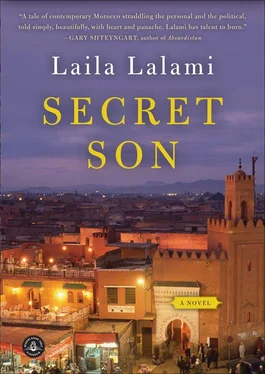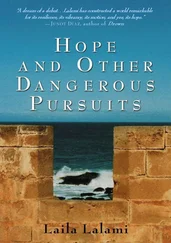They sat in the yard, on an old, hard divan that was pushed up against a peeling wall. Youssef’s mother stared at Amal with such intensity that Amal grew uncomfortable. She did not know how to begin. The best she could manage was, “I think you know who I am.”
“No, I don’t,” Youssef’s mother said. “Who are you?”
Amal was taken aback by the question. It was as though Youssef’s mother wanted to force Amal to say the words out loud, like a confession. “I am Youssef’s sister,” Amal said. As the words parted from her lips, she could feel a shift in the air, like a sigh of relief after someone has managed to pull out a painful splinter, but she was not sure whose pain was relieved by those four words — hers or Youssef’s mother’s. “I wanted to talk to him.”
“He’s not here.”
When Amal had found out about Youssef, she had been jealous of him for taking so much of her place in her father’s heart. In time, jealousy became anger and anger turned into shame and shame became sorrow — for what could have been and never was. Now, sitting in his house, she felt she had to explain her absence. “I didn’t know about him until last June.”
Youssef’s mother sat up, as if she had suddenly decided that this meeting was taking too long. “It doesn’t matter.”
But it does, Amal thought. I want to meet him. “My father didn’t know, either.”
“And you believed him?”
Amal let the sarcasm slide. She continued with her penance. “I wanted to say I was sorry about what my mother did. But you have to understand what it was like for her, finding out about all this.”
“Did you come here to apologize for them?”
Youssef’s mother was becoming impatient; it was time to get to more pragmatic matters. “I want to meet him.”
“That won’t be possible. He left for Tangier three weeks ago. He’s going to start over in Europe.”
It was over before it had even begun. There would be no relationship with Youssef, and life in Casablanca would continue in the same way it had before. Sometimes, Amal felt like a fish that had been taken out of water and put back; she was finding it difficult to breathe. Her mother and father quarreled; her brother was gone; several of her friends were still abroad, finishing degrees or starting new ones. In a city of five million, she felt unaccountably, incredibly alone. What was left? Who was left?
The alarm clock on Amal’s nightstand showed that it was 9 a.m. already, which meant it was about midnight on Friday in Los Angeles. She imagined Fernando getting home from an evening out, alone or with friends. He would drop his keys in the metal bowl in the hallway, slip his shoes off, toss the mail on the kitchen counter. Maybe he would make himself dinner. Maybe he would just go to bed. Maybe he would think of her. They had called, e-mailed, and written, but she always said she needed more time.
“Time for what?” he would ask.
“I don’t know,” she would say.
It will pass, child, her mother said, it will pass. But it had not. It was love. It was still there, throbbing with life, and no amount of distraction seemed to have any effect on it. It was like a language she had learned to speak; how could she learn to unspeak it? Amal could still remember the way Fernando’s lips tasted, the heft of his arms around her shoulders, the sound of his voice when he laughed, his breath against her hair at night. Weekends were hard, and this one was hardest of all.
Once, she remembered, they had gone to a fancy restaurant in Santa Monica, where they were meeting some friends for a birthday dinner. Fernando had worn a black jacket and Amal was in a cocktail dress, and they stood on the sidewalk under a green awning, chatting with their friends, waiting to be seated. An old man pulled up in a luxury car and, leaving his door open, walked up to Fernando and handed him the keys. It took a few seconds for everyone to realize that the old man thought Fernando was one of the parking valets. There was contrite laughter, and the old man, teasing his false teeth with his finger, looked around him, suddenly noticing the real valets in red vests.
“That was strange,” Amal said when the man was out of earshot.
Fernando shook his head. “Not really. He’s just used to brown people waiting on him.”
Even though he had shrugged the incident off, Amal could see that Fernando had been upset by it. It was one of those little things that seemed entirely insignificant in isolation but over time made you feel you did not belong. She knew the feeling well. After all, her race had been the biggest signifier about her in America. “Are there many Arabic women who go on to study in college?” one of her TAs had asked. Amal did not know whether it would be too impolite to point out that Arabic was a language, not a people. “But you don’t look Arab,” a middle-aged school registrar had said upon finding out that Amal was from Morocco — and she said it in a tone that suggested it was a compliment. When Amal had sold her car, the used-car dealer had asked if the trunk was empty. “Yes,” she said. “No explosives or anything?” he replied, and laughed and laughed and laughed. These words added up over time, like grains of sand in a glass jar, telling her she did not belong. So she knew. She knew what it felt like, and she held Fernando’s hand and pressed it and said nothing.
Home and away. She had known both; found good in both; loved and hated both. She did not want to have to choose one or the other, because in every choice something is gained but something is also lost. And in any case, why was home thought of as a place? What if it were something else?

Youssef had never read Farid Benaboud’s Casablanca Magazine with much regularity, but two days after his meeting with Hatim, he went out and bought a copy from the newsstand. It contained the usual offerings — news, cartoons, reviews. There was an in-depth report about a bank buyout, an article on infighting ahead of a local party’s national convention, a column about the national team’s chance in the next World Cup, an interview with a popular hip-hop band. Then there was Benaboud’s editorial, in which he wrote about the failure of the latest literacy campaign to make significant gains. The picture that accompanied his piece showed him at his desk, his reading glasses perched on his nose, his chin resting on his palm.
Youssef remembered Benaboud’s visits to the apartment, the first time for an interview about the tourism business, the second to ask for help with the libel suit brought against him by a government minister. He had asked good questions about how Nabil Amrani ran his businesses, he had brought up the salaries of his employees, he had even defended the Party against Nabil’s accusations. What if the roles had been reversed, and Youssef had been the journalist while Benaboud had been the bastard son? Would Benaboud have agreed to Hatim’s plans, too?
At the headquarters of the Party, it had seemed natural to agree that Benaboud was a part of Nabil Amrani’s world and that he represented the worst it had to offer. But the more Youssef thought about Benaboud’s visits, the more difficult it became to think of him as a symbol of everything that was wrong with the country. What about everyone else — government ministers, political activists, industry heads, union leaders, university teachers, college students — what had they done for the country?
It was true that Benaboud should have been more thorough in his article. He should have spoken to Hatim; he should have visited Hay An Najat; he should have tried to see things for himself. On the other hand, was it not enough for Hatim that he had At Tariq , where he could write what he wanted? If he disliked what Farid Benaboud had to say, why couldn’t he respond in the same way?
Читать дальше













